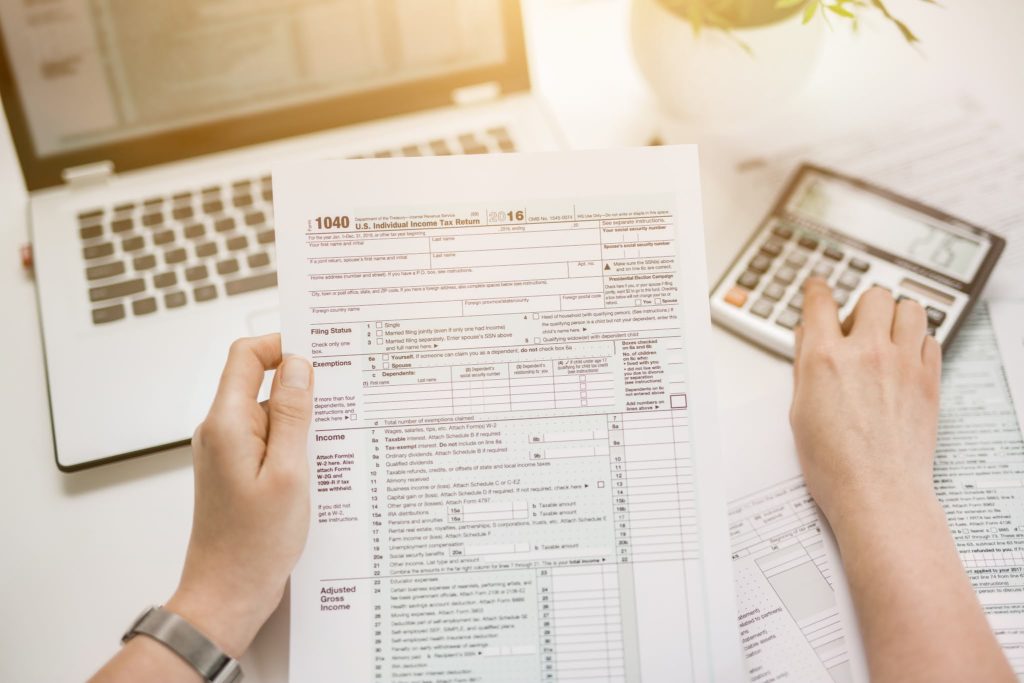Starting and running a small business doesn’t just take ingenuity, grit, and resolve.
It also takes a whole lot of paperwork.
From getting your Employer Identification Number, to filing your business income taxes, to everything in between, here’s a simple guide to some of the most common tax forms that small business owners should be familiar with.
Tax forms for when you’re just starting: Form SS-4, Form 2553, Form 8832
Form SS-4, Application for Employer Identification Number: When you start your business, you’ll need to fill out this form to receive an EIN. This number is what you’ll use to identify your business on your tax return as well as on wage and payment forms you send out to employees or contractors.
However, if you are a sole proprietor without employees, you may opt to use your social security number instead of an EIN.
Form 2553, Election by a Small Business Corporation: If you decide to form your business as an S corporation, this is the form you’ll fill out. In general, you must make this election by the 15th day of the third month after the beginning of the tax year for which the election is to be in effect.
Form 8832, Entity Classification Election: This form is for businesses that are operating as limited liability corporations, or LLCs. By filling this form, LLCs can choose to change their tax status from the one automatically assigned as LLCs by default are considered as a disregarded entity or a partnership based on the number of partners. This form allows you to choose the most advantageous tax status for your LLC
Tax forms for small businesses with employees or that use independent contractors
Form W-2: If you paid employee wages, withheld income, Social Security, and/or Medicare taxes, or if you paid more than $600 in wages to an employee without withholding any taxes, you’ll file this form with the IRS for each employee. You’ll also need to mail each employee a copy of their W-2 by Jan. 31 each year.
Form 1099-NEC, Nonemployee Compensation: This form is used to report any payments over $600 that you made to a contractor or freelancer—a person who performed services for your business, but is not a regular employee.
Form W-3, Transmittal of Wage and Tax Statements: This form is required for any business that has employees and files Form W-2 and is a summary of the total wages, commissions, tips, and other compensation that you paid to W-2 employees through the year.
Form 940, Employer’s Annual Federal Unemployment Tax Return: Form 940 is used to calculate and pay federal unemployment taxes, although it’s only required if you payout at least $1,500 in wages, or pay one or more employees for 20 or more weeks during the year (whether the employee is full or part-time).
Form 941, Employer’s Quarterly Federal Tax Return: This is the form you use to report quarterly income taxes, Social Security tax, or Medicare tax withheld from employee’s paychecks. This is also what you use to pay your (the employer’s)portion of Social Security or Medicare tax.
Form 944, Employer’s Annual Federal Tax Return: This is the form you’ll use to report your federal income tax withheld and the Social Security and Medicare (FICA) tax if your annual liability of these taxes is less than $1000.
Form 945, Annual Return of Withheld Federal Income Tax: Use this form to report any federal income taxes withheld from non-payroll payments. This includes:
- Pensions (including distributions from tax-favored retirement plans, for example, section 401(k), section 403(b), and governmental section 457(b) plans), and annuities
- Military retirement
- Gambling winnings
- Indian gaming profits
- Voluntary withholding on certain government
- payments
- Backup withholding
Forms for business expenses and deductions
Form 4562, Depreciation and Amortization: This form lets you report depreciation or amortization on equipment, furniture, automobiles, and other business property.
Form 8829, Expenses for Business Use of Your Home: For business owners, freelancers, and contractors who work out of a home office, if they use a part of their home regularly and exclusively for business this form allows you to find the allowable expenses for such business use of your home to report on your Schedule C. This is known as the home office deduction.
Other small business tax forms
Form 1065, U.S. Return of Partnership Income: If your business is a partnership, you’ll file an information return to report their income, gains, losses, deductions, credits, etc.
One unique thing about the partnership structure is that the partnership itself does not pay taxes on its income—instead, the income “passes through” to the individual partners. The partners must include those profits and losses on their Schedule K-1, Form 1065.
Form 1040-ES: This form is how you figure and pay your quarterly estimated taxes for self-employment to the IRS.
Form 1040 (Schedule C): If you are a sole proprietor, this is the form you use to report any income or losses from your business. This form is included with your Form 1040–Individual Income Tax Return.
Need help with your small business taxes? Contact AG FinTax today!
Starting and running a small business doesn’t just take ingenuity, grit, and resolve.
It also takes a whole lot of paperwork.
From getting your Employer Identification Number, to filing your business income taxes, to everything in between, here’s a simple guide to some of the most common tax forms that small business owners should be familiar with.
Tax forms for when you’re just starting: Form SS-4, Form 2553, Form 8832
Form SS-4, Application for Employer Identification Number: When you start your business, you’ll need to fill out this form to receive an EIN. This number is what you’ll use to identify your business on your tax return as well as on wage and payment forms you send out to employees or contractors.
However, if you are a sole proprietor without employees, you may opt to use your social security number instead of an EIN.
Form 2553, Election by a Small Business Corporation: If you decide to form your business as an S corporation, this is the form you’ll fill out. In general, you must make this election by the 15th day of the third month after the beginning of the tax year for which the election is to be in effect.
Form 8832, Entity Classification Election: This form is for businesses that are operating as limited liability corporations, or LLCs. By filling this form, LLCs can choose to change their tax status from the one automatically assigned as LLCs by default are considered as a disregarded entity or a partnership based on the number of partners. This form allows you to choose the most advantageous tax status for your LLC
Tax forms for small businesses with employees or that use independent contractors
Form W-2: If you paid employee wages, withheld income, Social Security, and/or Medicare taxes, or if you paid more than $600 in wages to an employee without withholding any taxes, you’ll file this form with the IRS for each employee. You’ll also need to mail each employee a copy of their W-2 by Jan. 31 each year.
Form 1099-NEC, Nonemployee Compensation: This form is used to report any payments over $600 that you made to a contractor or freelancer—a person who performed services for your business, but is not a regular employee.
Form W-3, Transmittal of Wage and Tax Statements: This form is required for any business that has employees and files Form W-2 and is a summary of the total wages, commissions, tips, and other compensation that you paid to W-2 employees through the year.
Form 940, Employer’s Annual Federal Unemployment Tax Return: Form 940 is used to calculate and pay federal unemployment taxes, although it’s only required if you payout at least $1,500 in wages, or pay one or more employees for 20 or more weeks during the year (whether the employee is full or part-time).
Form 941, Employer’s Quarterly Federal Tax Return: This is the form you use to report quarterly income taxes, Social Security tax, or Medicare tax withheld from employee’s paychecks. This is also what you use to pay your (the employer’s)portion of Social Security or Medicare tax.
Form 944, Employer’s Annual Federal Tax Return: This is the form you’ll use to report your federal income tax withheld and the Social Security and Medicare (FICA) tax if your annual liability of these taxes is less than $1000.
Form 945, Annual Return of Withheld Federal Income Tax: Use this form to report any federal income taxes withheld from non-payroll payments. This includes:
- Pensions (including distributions from tax-favored retirement plans, for example, section 401(k), section 403(b), and governmental section 457(b) plans), and annuities
- Military retirement
- Gambling winnings
- Indian gaming profits
- Voluntary withholding on certain government
- payments
- Backup withholding
Forms for business expenses and deductions
Form 4562, Depreciation and Amortization: This form lets you report depreciation or amortization on equipment, furniture, automobiles, and other business property.
Form 8829, Expenses for Business Use of Your Home: For business owners, freelancers, and contractors who work out of a home office, if they use a part of their home regularly and exclusively for business this form allows you to find the allowable expenses for such business use of your home to report on your Schedule C. This is known as the home office deduction.
Other small business tax forms
Form 1065, U.S. Return of Partnership Income: If your business is a partnership, you’ll file an information return to report their income, gains, losses, deductions, credits, etc.
One unique thing about the partnership structure is that the partnership itself does not pay taxes on its income—instead, the income “passes through” to the individual partners. The partners must include those profits and losses on their Schedule K-1, Form 1065.
Form 1040-ES: This form is how you figure and pay your quarterly estimated taxes for self-employment to the IRS.
Form 1040 (Schedule C): If you are a sole proprietor, this is the form you use to report any income or losses from your business. This form is included with your Form 1040–Individual Income Tax Return.
Need help with your small business taxes? Contact AG FinTax today!




